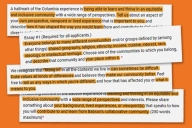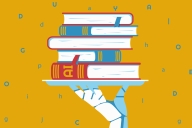You have /5 articles left.
Sign up for a free account or log in.

Getty Images
In the run-up to the presidential election last year, the FBI warned that foreign-backed online journals were likely to spread disinformation about the 2020 elections by disseminating articles with misleading or unsubstantiated information in an effort to “exacerbate disunity and dysfunction in the United States.”
For Roger Schonfeld, director of libraries, scholarly communication and museums for Ithaka S+R, the FBI warning was an attention grabber. As someone responsible for fueling evidence-based innovation and leadership among libraries, publishers and museums, Schonfeld had long grappled with questions about how open access to scholarship is unleashing both positive and negative effects in society.
In a widely discussed Scholarly Kitchen piece published last week, Schonfeld said that misinformation, politicization and other problems embedded in the open-access movement stem from a “mismatch” between the incentives in science and the ways in which “openness and politicization are bringing science into the public discourse.”
While open access has democratized science, to good effect -- making research available to sick patients interested in learning more about their condition or to scientists working in the Global South -- it also has had “second-order effects” that are more concerning, he said.
“It’s now easier for scientific literature to be quoted and used in all sorts of political discourse,” Schonfeld said in an interview. “When the methods of scholarly publishing that we use today were first formed, there was no sense that there was going to be a kind of politicized discourse looking for opportunities to misinform the public and intentionally cause disunity.”
As someone working at the nexus of libraries and scholarly publishing, Schonfeld said he was motivated to write his piece in part because he has seen a lot of tension and debate over the economics of publishing, without commensurate attention paid to how to better police fraud and prevent misinformation, a role that he believes scholars and librarians have a responsibility to take on.
Schonfeld isn’t the only one thinking about the unintended effects of open science. Brian Nosek, a psychology scholar who has long considered these questions, is the co-founder and executive director of the Center for Open Science and a professor of psychology at the University of Virginia. The center’s mission is to increase the integrity of the open-access system.
He notes that the open movement in science has placed a lot of emphasis on the end of the research process -- results. But he said a core incentive problem needs to be fixed if scholars are going to operate in a results-oriented system.
“Publishing is the currency of advancement,” Nosek said. “I, as a researcher, have a conflict of interest in what’s good for me in terms of career advancement and what’s good for science … The reward system is about beauty and novelty, and that’s distinct from the reality of everyday research, which is messy and has lots of false starts. What we aim to do is realign [the] reward structure so what’s good for science and what’s good for the scientist is the same thing.”
COS offers a preregistration option for researchers who want to combat the conflict-of-interest problem by recording their research goals and methodology before diving into a project. Another mechanism COS has set up for researchers who want to embrace openness with the correct incentives is what Nosek calls “registered reports.” He said about 300 journals now offer the option.
Instead of the typical research process, where authors write up results and submit them for peer review, the COS registered reports system instead asks scholars to do discovery work and write up their idea as a proposal for journals to review and precommit to publishing if they think the question is important and the methodology is good. He said the system removes conflicts of interest by “releasing me as author from having to figure out how to massage results to be publishable.”
More than 400,000 users now work with the Open Science Framework, a scholarly repository COS built for sharing, searching and aggregating registrations of research, Nosek said. Some 80,000 preregistered studies are housed there. His center awards badges to journals that adopt a preregistration system.
“It signals the norms of that journal community and signals the values of the publication,” Nosek said of the badge system.
While some scholars and publishers have been critical of the preprint services for not doing more to combat their role as potential “vectors of misinformation,” to quote Schonfeld, Richard Sever, the co-founder of bioRxiv and medRXiv, two major preprint services, said preprints are valuable additions to scholarly publishing. Sever straddles two worlds, since he is also assistant director of the Cold Spring Harbor Laboratory Press. He dismissed much of the criticism of preprints as shortsighted, given the power they have to disseminate research worldwide with the push of a button.
“Open-access preprints are facilitated by technology,” he said. “Prior to the web, you’d have a result and you’d share it with another scientist and make a photocopy and mail it. What happens with the web is suddenly you can put it up and anyone with an internet connection can read it.”
Sever noted that one of the most important trials on COVID treatment -- which was later published in the New England Journal of Medicine -- originally appeared as a preprint. With the pandemic, he said, clinical scientists realized that preprints were “essential, because they had to make science happen faster than ever.”
Schonfeld’s view was less rosy, arguing that as use of preprints has surged among scholars seeking to release results early online, lots of “bunkum” has been allowed to spread worldwide very quickly.
“It’s an illustration of how the open movement has created a vector in which literature that never would have been available publicly, never would have been available to tweet about, is now available for anyone to look at,” Schonfeld said. “No part of the sector has taken account for the various ways that it can account for trustworthiness.”
Schonfeld said that like publishers, which sometimes house preprint services, universities have a major role to play in ensuring unbiased and rigorous scholarship, but often this duty is “treated as just a compliance function.”
Ivan Oransky is an M.D. who co-founded the nonprofit website Retraction Watch, whose motto is “tracking retractions as a window into the scientific process.” He blamed the abundance of retractions on preprints, the overall growth of misinformation as a cottage industry and what he called the “abject failure” of peer review to catch problems that it should. But he said these challenges aren’t new and open access shouldn’t be blamed.
“All of the people who have been defending what is actually a broken system for decades are shifting blame to preprints and open science, and -- I know this sounds cynical -- but I know part of the reason they are doing that is preprints are a major threat to the business model,” Oransky said.
Oransky, a professor of medical journalism at New York University, said that misinformation would be just as rampant a problem in a society with only paywalled, peer-reviewed journals. His database now holds 31,000 retractions, which come in at a rate of about 2,500 to 3,000 a year. Thanks to technology, he said, a community of sleuths gathers online and looks for mistakes in articles, helping to populate the Retraction Watch database.
“Technology allows people to publish more and publish more crap, but it also allows more people to find the crap,” Oransky said. “It cuts both ways, and we have to be open and honest about that.”








